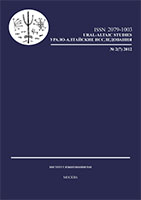О происхождении русских игровых терминов: сало, салки, масло
On the origins of the Russian games’ terms: salo, salki, maslo
Author(s): Maria KlyuchevaSubject(s): Language and Literature Studies, Theoretical Linguistics, Morphology, Lexis, Historical Linguistics
Published by: Институт языкознания Российской академии наук
Keywords: the Russian dialects; the Turkic languages; the Finno-Ugric languages; borrowings; terms of children’s games
Summary/Abstract: The article deals with the etymology of the Russian dialect terms of children’s games: salo, salki, solʹ, maslo (mazlo) and their derivatives. It is established that originally the terms salo and solʹ designated certain most important loci in the game space and were descended from the Turkic-Bulgarian salá ‘village’ (with the change of meaning from local to “food”). The term maslo was derived from salo as a synonym with “food” meaning.
Journal: Урало-алтайские исследования
- Issue Year: 2012
- Issue No: 02 (7)
- Page Range: 039-051
- Page Count: 13
- Language: Russian

